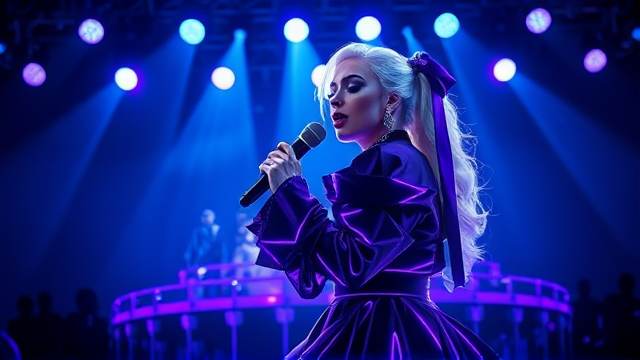Andrew Lloyd Webber Praises Lady Gaga's Concert
The hallowed, velvet-draped world of Broadway found an unexpected, and utterly dazzling, echo in the pulsating heart of a pop spectacle recently, as the legendary composer Andrew Lloyd Webber, the modern-day maestro behind some of the most enduring melodies in theatrical history, publicly tipped his hat to Lady Gaga. The occasion was one of Gaga's electrifying live performances, where the pop provocateur, in a move that felt less like a simple homage and more like a spiritual passing of the torch, wove subtle yet unmistakable references to Webber's magnum opus, *The Phantom of the Opera*, into her own sonic tapestry.For those of us who live and breathe the theatre, who understand the sacred contract between performer and audience that is forged under the lights, this was more than just a celebrity endorsement; it was a validation of musical theatre's enduring power to infiltrate and elevate popular culture. Webber’s specific praise for her live vocals, which he crowned 'absolutely fabulous,' is the kind of accolade that carries the weight of a lifetime spent in pursuit of vocal excellence and dramatic truth.Imagine the scene: the raw, unfiltered power of Gaga's voice, a instrument honed not just in recording studios but on the global stage, momentarily channeling the gothic romance and soaring anguish of Christine Daaé. It’s a connection that makes profound sense when you consider Gaga’s own roots, her rigorous training at the Lee Strasberg Theatre and Film Institute, and her career-long performance art project that treats every concert not as a mere recital of hits, but as a narrative-driven piece of theatre.This moment of cross-genre appreciation speaks to a larger, thrilling trend where the once-rigid walls between the West End and the pop charts are crumbling. We've seen it with the jukebox musical phenomenon, sure, but this is different—this is a pop titan internalizing the language of classic musical theatre and re-contextualizing it for a stadium of tens of thousands, proving that the emotional core of 'The Music of the Night' can beat just as fiercely in a synth-pop anthem.For Webber to acknowledge this so publicly is a significant nod from the old guard to the new, a recognition that the future of storytelling through song is being written not only in rehearsal rooms but also in these colossal, shared experiences of live pop music. It’s a reminder that whether the stage is made of worn floorboards or a sprawling arena catwalk, the ultimate magic lies in the unassailable, breathtaking power of a human voice, live and unadorned, hitting that perfect note and, for a moment, making the entire world disappear.
Latest News
In a move that feels both long overdue and perfectly timed for the current digital epoch, VICE has officially thrown its hat into the ring of creator economy
2 days ago3 comments
The rhythm of the music industry has hit a discordant note, as the legendary Busta Rhymes, an artist whose career has been a masterclass in lyrical dynamism
2 days ago6 comments
The narrative power of metal music, a truth long understood by its devotees, finds its ultimate expression in the concept album, a format where bands trade
2 days ago8 comments
Darby Allin is feeling alive after his return from Mt.
2 days ago12 comments
In the grand, unpredictable symphony of popular music, a song's legacy is never just about the notes on the page or the voice in the recording; it's about the
2 days ago3 comments
The air in Kobe’s Glion Arena crackled with a rare, almost archival energy on that October night, a feeling that transcends the usual stadium roar—this wasn't
2 days ago5 comments
In a move that echoes the delicate diplomatic choreography more commonly seen in United Nations assemblies than in song contests, the European Broadcasting
2 days ago7 comments
The venerable halls of Christie's, a temple to art and antiquity where whispers of gavels have consecrated the exchange of cultural totems for generations,
2 days ago7 comments
CH
Chloe Bennett123k2 days ago
tbh the image of her voice against a dark stage like that is kinda stunning idk
0
JA
Jamie Larson123k2 days ago
wait what i never knew gaga had theater training that's actually so cool, makes total sense now
0
JA
Jamie Larson123k2 days ago
wait is this real? i feel like celeb endorsements are so calculated these days tbh
0
